What is fake news? Everybody has become familiar with the phrase since last year US election. In the aftermath of one of the most unlikely defeats in the history of presidential races, professional analysts and well-paid but not so professional political commentators were desperate to find plausible and not so plausible explanations to justify their failings (one of the most plausible explanations would have been the experts’ own myopia, but these are not necessarily the sort of people who not like to see their expertise being questioned by anyone). As it happened with Brexit, experts often resorted to the concept of populism and a supposed mounting anger directed at experts’ elitism to explain why elections and popular votings did not go the way they saw more in harmony with the imminent and inevitable coming of the liberal world order. One of the most successful theories to understand Trump’s victory was the epidemy of fake news websites and fake news campaigns allegedly directly orchestrated by the Russian government.
Mainstream media, that is to say, long established, large, powerful, resourceful and influencial media organizations, famously do not like the phrase “mainstream media”. They tend to reject the sole notion that mainstream media exist at all, and they interpret every use of the phrase as a sign of malign propaganda against them, akin to some conspiracy theory. The fact that many mediatic personalities working for large media organizations obtain a disproportional amount of influence thanks to their semi-celebrity status and exert this influence over many decades seems to elude many of these professional opinion makers: they do not seem to see as a privilege that simply thanks to the constant exposure they are granted, rather than because of some sort of congenital value, their opinions and petty thoughts matter more than that of most people. Mainstream media often looks like some sort of “Big Brother”, the reality show: the opinions of these experts and media personalities appear more interesting and more of value just because they are incessantly on screen.
Fake news is as old as journalism. It does not have to be necessarily straight out lying. No, that would be just too obvious and it is the sign of amateurishness. The real fake news in the art of the skillful omission, the willful twisting of words, the innuendo, all with a large dose of good old sensationalism.
In our tense days, fake news is very dangerous territory. For this reason, we have been very careful in drafting this list of the most significant fake stories of 2017. You will not find anything slightly conspirational here: we do not have the resources to question for example the veracity of the versions of the Khan Shaykhun chemical attack which took place in Syria in April. Most importantly we do not want to give people and organizations with lots more resources and financial clout than we have a free pass to label us a cheap propaganda outlet: for this reason the eternal and still ongoing drama of Russiagate did not make it to the list.
10. The Sun finally aknowledges: Kiev is in Russia
In an online report published on all-white football fans in Kiev, the British tabloid The Sun writes “Racism in Russia”. The headline was later corrected, but no apologies or mentions of the previous mistake are present.

9. Trump – Merkel: A handshakeless meeting
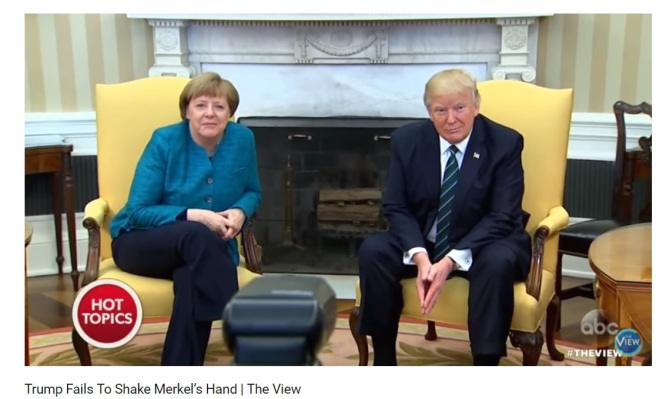
There are probably many reasons not to like Donald Trump. Sometimes, however, he is unfairly attacked. There was a lot of sensation when during the first meeting held with Mrs Merkel at the White House in March, Trump apparently failed to react to the many requests for a handshake photo-op by the photographers and by Merkel herself. A Guardian journalist called it a “glum and handshakeless” encounter. Other publications, however, probably because of the language barrier, seem to have failed to catch up with the prevailing news stories avalanche of an unfriendly Trump and showed us a very different picture.
8. Russia organized a coup in Montenegro
The little Balkan state has been the last nation to join NATO in 2017. In October 2016, on Election day, a coup was thwarted by Montenegrin security forces. The coup was aimed at killing the Montenegrin Prime Minister Milo Djukanovic and stopping the country’s process of NATO integration, reported the Telegraph in February.
Here a few lines that perfectly crystallize of the sort logic employed in the report:
Sources said the plot appeared to have been constructed so it was deniable and could be blamed on rogue Russian agents and nationalists, but evidence showed it was inconceivable it did not have high-level backing. “You are talking about a plot to disrupt or take over a government in some way,” one source said. “You can’t imagine that there wasn’t some kind of approval process.”
More on this story here.
7. Russia propelled the far right in Germany
Russians, or better said, Germans of Russian origin who emigrated to Germany after the collapse of the Soviet Union, make up a third of Alternative für Deutschland voters, the new “far right” party, reports TIME, picking up on a story originally published by Bloomberg.
Let’s do some very simple math: AfD got 5.9 million votes in September election. Of the roughly 3 million Russian Germans who currently live in Germany, 1.5 m were entitled to vote. Even assuming that all of them voted for AfD for Germany, which seems to be rather unlikely, that would mean that the “Russians” would make up for 25% of the total votes received by the AfD. Another wildly exaggerated claim by the otherwise objective and stellarly reporting media.
6. Here is the proof that Russia paid for the election – her own
We paused for a second or two wondering if a story originally published by that reliable and most respectable of media outlet that Buzzfeed is could make it to this list. It was reported that the Russian Foreign Ministry had paid $ 30,000 to its embassy in Washington with the note: “To finance the election campaign of 2016”.
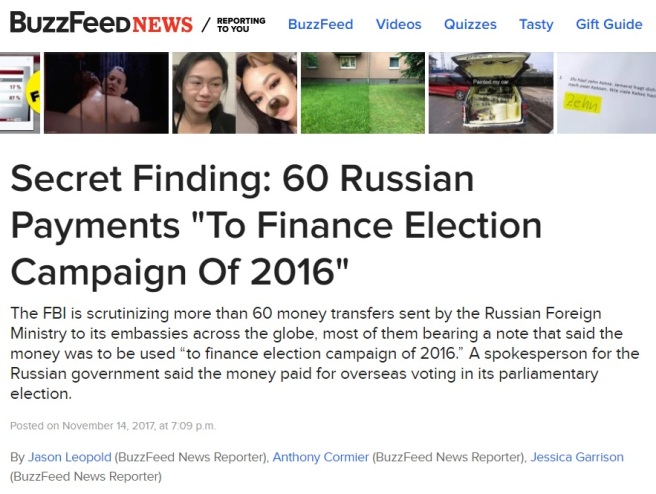
There is one thing, however, that Buzzfeed failed to mention in its scoop: Russia had an election too in 2016. The payments were sent to 60 Russian embassies across the world.
5. Russia is invading – again
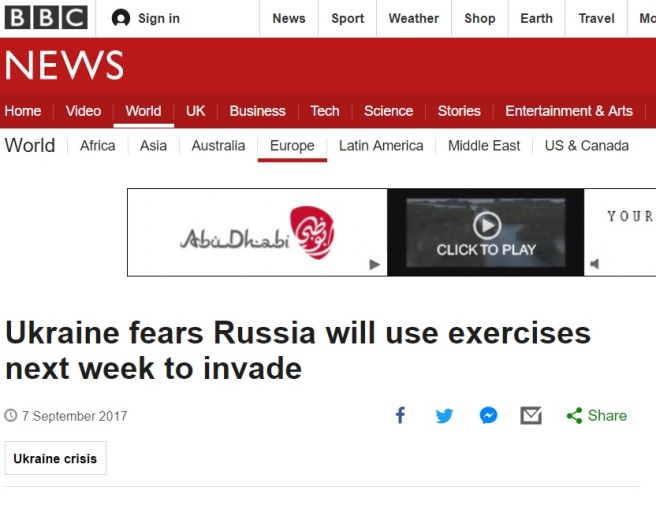 There was a lot of tension around the Russian military exercise that took place in Belarus in September. The Ukrainian President Poroshenko one more time expressed his concern that Russia was preparing to invade Ukraine – once again.
There was a lot of tension around the Russian military exercise that took place in Belarus in September. The Ukrainian President Poroshenko one more time expressed his concern that Russia was preparing to invade Ukraine – once again.

Even the British the Independent picked up a statement issued by NATO. More recent reports stated that the exercise was a preparation for the invasion of Europe and the bombing of NATO countries, as reported by the German tabloid BILD. The article is quoted by The Sun too.
September came and passed. And nothing happened. In an unusually honest report The Independent writes: “We might have overblown it a bit”.
4. Putin did it
Did fake news from Russia help Donald Trump win the White House? Yes, the internet is full of s**t, unrelieable information, to put it briefly. On the internet you can find websites that cater to all (conspirational) tastes. Some of them do good old sensational fake news, in the best of click-bait tradition. Are these sites tied to Russia? A simple looks at a list of the most popular “fake news” websites does not seem to confirm that. A story from the New York Times on November 1 shows the Russian controlled Facebook pages that allegedly helped veer the US election and discredit American democracy. The commonly quoted figure is that Russia spent an incredibile $ 100,000 in Facebook ads and “reached” millions of users. For comparison, Hillary Clinton’s campaign costed $ 1.2 billion, that is ten thousand times more. Just to put things in perspective. People with online marketing experience appear to be skeptical of the all-powerfulness of the Russian social media ad campaigns.
As Forbes contributor Tom Basile wrote in December 2016 already:
‘The “fake news” claim is perhaps the most offensive, but naturally many in the media have been tone deaf about it. “Fake news” is real. It is generated by websites, aggregators and email list-serves that blast out stories on social media and other online platforms of dubious credibility. We’ve all seen them. […] The mainstream news media would like people to believe that so many people actually thought enough of these stories were credible that the impact threw the election to Donald Trump. Denial is a terrible thing. Even more so, what is highlighted by this strategy is their elitism and continuing disdain for the average person. […] the editors who decided to create space in news cycle for that piece think millions of Americans are just to dumb to realize when something is so outrageous, it can’t be all true.’
3. The Catalan People’s Republic
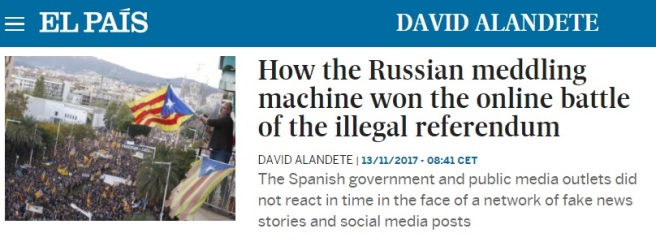
One of the largest political earthquakes of the year. And it is all about Russia once again. The Spanish government feared it was the work of Russian malign agents. The German Sueddeutsche Zeitung picked up the story too. “The Russians want to sow dissent in the European Union”, we are reminded one more time. Disunity in Europe does not come from the difficulty of conciling the interests of 28 (soon 27) very diffirent countries, but rather, it is forcefully planted there by skilled manipulators from the Kremlin.
Luckily for the Spanish government the EU has decided to spend one million euro a year to help a small team of experts counter this most pernicious Russian influence. The findings of the East Stratcom Task Force team on Catalonia are truly shocking. EU vs Disinformation found 10 stories aimed at the Catalan people. Since many of these stories are in Russian or excerpts from Russian TV talks shows (yes, these people there get paid to watch TV 24/7! Isn’t it for many the dream job?), we have to assume that the demonstrations in Barcelona were full of people who are secretly learning Russia and who will soon apply to the admission into the Russian Federaion.
2. Comrade in Chief Trump
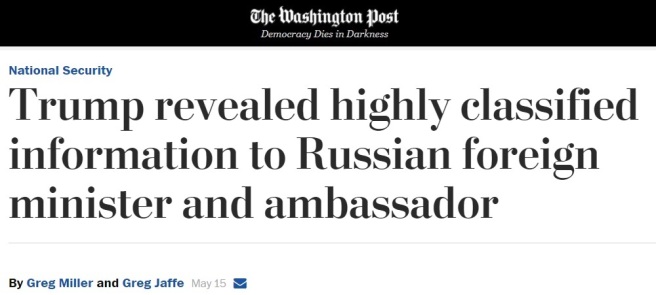
Four months into the presidency and Trump is already doing what everybody had been expecting him to do all the way, that is to say, passing on secret information to a “hostile power”, as the Washington Post reported on the 15 of May. It came as a bit of a shock of course that the Spy-In-Chief did it inside the White House, all of places, but you certainly were not expecting Trump to be the most apt of spies, did you?
And by the way, what did Trump share with the Russian Foreign Minister and the Russian Ambassador to the US? It turns out he mentioned a plot by ISIS to bomb planes using laptops, “common threat to our two countries”, as Trump himself and Trump national security adviser later revealed. Trump’s less than careful handling of classified information could have put the life of an Israeli spy in Syria in danger, worried Israel, which was rumoured to be the source of the intelligence. Certainly the life of one Israeli spy counts more than the lives of many possible victims of a random terrorist attack to civilian aviation.
1. Putin is preparing for World War III
This is probably the ultimate Putin’s story. And also a very recent one, which Newsweek released only last week.
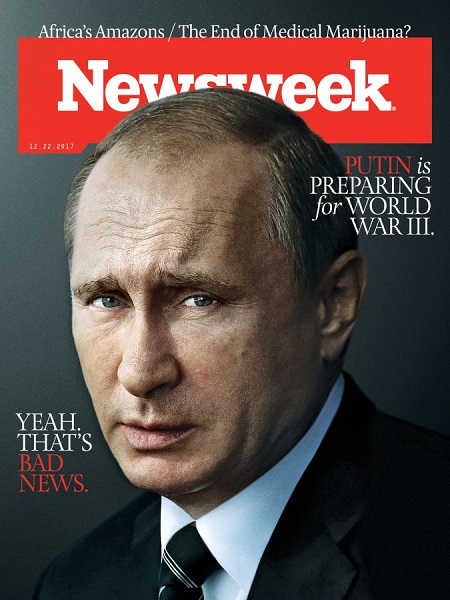
It has everything it is required to make it the perfect story and the undisputed winner of this year contest: Putin, the world bully, is preparing for the largest war since Hitler and Stalin, the war of the century and possibly the final war humanity will ever see. Why shouldn’t you be scared?
“Russia, surrounded by enemies, is readying to fight an epic war for survival”, the story begins, written by Owen Matthews, long time Moscow correspondent for Newsweek. Mr Matthews is himself a regular guest at Russian state-controlled TV talk shows (where, in all honesty, he is not made to look very well) which he dismisses, as a real and professional Western journalist should never fail to do, as Kremlin propaganda. The story of Putin, preparing for a new war, possibly a war of aggression (because what else could he do, he is only a dangerous dictator after all), appears to be based on a statement from a speech Putin gave in November to some business leaders:
“The ability of our economy to increase military production and services at a given time is one of the most important aspects of military security,” he told a meeting of top military brass in Sochi. “All strategic and simply large-scale enterprise should be ready.”
And it goes on:
But there’s another, more worrying reason for the Kremlin’s belligerent rhetoric—it is convinced war is imminent. As long ago as 2013, even before the conflict in Ukraine, the Russian Defense Ministry’s annual strategic plan, titled “The Defense of Russia,” predicted a serious global or regional conflict involving Russia before 2023. “Senior Russians talk about not if but when there is going to be a major war,” says Andrew Monaghan, of Pembroke College, Oxford, and the NATO Defense College in Rome. “They are already on a war footing and have been on it for a long time.”
It seems a rather thin thread for a story on the imminent war initiated by Putin, the largest war humanity will ever have seen. Iturns out Russia has been preparing for war since 2013. “Si vis paecem, para bellum”, went an old Latin saying: “If you want peace, prepare for war”. The wisdom of this old saying seems to have gone lost on many.
One thought on “The top 10 mainstream media fake news of 2017”